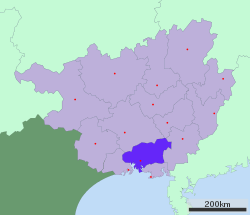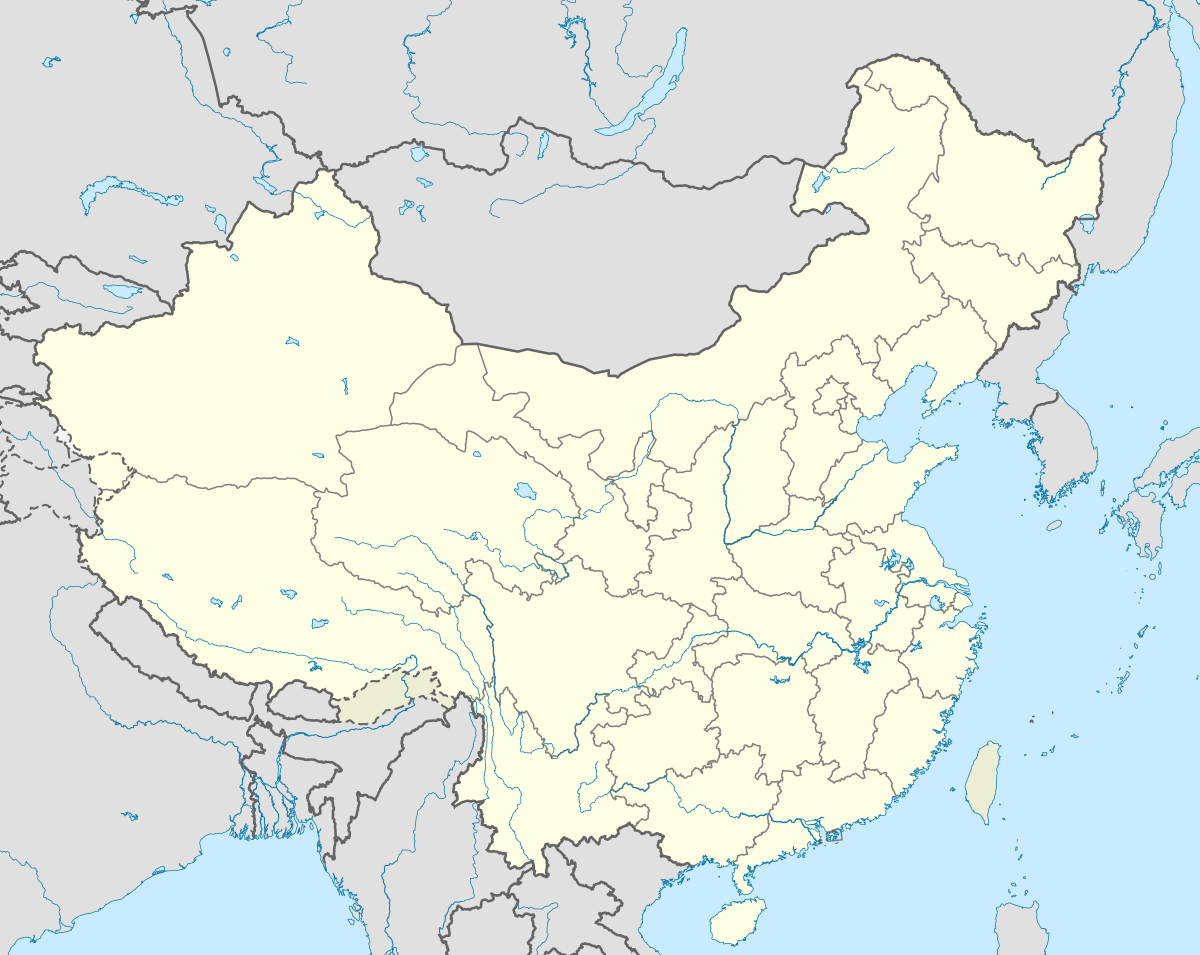Qinzhou
Qinzhou (postal: Yamchow, simplified Chinese: 钦州; traditional Chinese: 欽州; pinyin: Qīnzhōu, Jyutping: Jam1 zau1 (Canton) /Ham1 zau1 (Local) )[1] is a prefecture-level city in Guangxi, China, lying on the Gulf of Tonkin and having an urban population of 433,000.
Qinzhou 钦州市 • Ginhcouh Si | |
|---|---|
 Qinzhou government buildings | |
 Location of Qinzhou City jurisdiction in Guangxi | |
 Qinzhou Location in China | |
| Coordinates (Qinzhou municipal government): 21°58′52″N 108°39′14″E | |
| Country | People's Republic of China |
| Autonomous region | Guangxi |
| Municipal seat | Qinbei District |
| Area | |
| • Prefecture-level city | 5,250 km2 (2,030 sq mi) |
| Elevation | 12 m (39 ft) |
| Population (2015) | |
| • Prefecture-level city | 4,041,000 |
| • Density | 770/km2 (2,000/sq mi) |
| • Metro | 588,600 |
| Time zone | UTC+8 (China Standard) |
| Postal code | 535000 |
| Area code(s) | 0777 |
| ISO 3166 code | CN-GX-07 |
| Licence plate prefixes | 桂N |
| Website | www |
| Qinzhou | |||||||||||||
|---|---|---|---|---|---|---|---|---|---|---|---|---|---|
| Chinese name | |||||||||||||
| Simplified Chinese | 钦州 | ||||||||||||
| Traditional Chinese | 欽州 | ||||||||||||
| Postal | Yamchow | ||||||||||||
| |||||||||||||
| Zhuang name | |||||||||||||
| Zhuang | Ginhcouh | ||||||||||||
| 1957 orthography | Ginƅcouƅ | ||||||||||||
History
The area originally belonged to Guangdong and was transferred to Guangxi in 1965. The city was originally a county Qinxian (postal: Yamhsien). From the beginning of the present era, Qinzhou (Wade-Giles: K'in-chou) was for many centuries "the center of Chinese overland trade with Indo-China".[2]
Administration
The Qinzhou municipal region comprises two (county-level) districts and two counties.
Population data is as of 2009.[3]
- Qinnan District (钦南区) - pop. 570,000
- Qinbei District (钦北区) - pop. 650,000
- Lingshan County (灵山县) - pop. 1,400,000
- Pubei County (浦北县) - pop. 810,000
| Map |
|---|
Geography
Despite its latitude and location on the Gulf of Tonkin coast, Qinzhou has a monsoon-influenced humid subtropical climate (Köppen Cwa), with short, mild winters, and long, hot and humid summers. Winter begins dry and rather sunny but becomes progressively wetter and cloudier. Spring is generally overcast and often rainy, while summer continues to be rainy though is the sunniest time of year; the coastal location moderates summer daytime temperatures, but there are 10.9 days annually with rainfall totaling at least 50 mm (1.97 in). Autumn is sunny and dry. The monthly 24-hour average temperature ranges from 13.9 °C (57.0 °F) in January to 28.6 °C (83.5 °F) in July, and the annual mean is 22.53 °C (72.6 °F). Mean annual rainfall is just above 2,170 mm (85 in), the majority of which, on average, occurs from June to August in large totals in excess of 380 mm (15 in) each month. With monthly possible sunshine ranging from 17% in February to 55% in September, the city receives an average of 1,721 hours of bright sunshine annually.
| Climate data for Qinzhou (1981−2010 normals) | |||||||||||||
|---|---|---|---|---|---|---|---|---|---|---|---|---|---|
| Month | Jan | Feb | Mar | Apr | May | Jun | Jul | Aug | Sep | Oct | Nov | Dec | Year |
| Record high °C (°F) | 27.7 (81.9) |
31.5 (88.7) |
31.3 (88.3) |
34.0 (93.2) |
34.7 (94.5) |
37.0 (98.6) |
37.9 (100.2) |
37.5 (99.5) |
36.9 (98.4) |
35.3 (95.5) |
32.9 (91.2) |
28.8 (83.8) |
37.9 (100.2) |
| Average high °C (°F) | 17.8 (64.0) |
18.7 (65.7) |
21.6 (70.9) |
26.5 (79.7) |
30.1 (86.2) |
31.5 (88.7) |
32.1 (89.8) |
32.4 (90.3) |
31.6 (88.9) |
29.0 (84.2) |
25.0 (77.0) |
20.8 (69.4) |
26.4 (79.6) |
| Daily mean °C (°F) | 13.9 (57.0) |
15.2 (59.4) |
18.2 (64.8) |
23.0 (73.4) |
26.4 (79.5) |
28.1 (82.6) |
28.6 (83.5) |
28.5 (83.3) |
27.5 (81.5) |
24.6 (76.3) |
20.3 (68.5) |
16.1 (61.0) |
22.5 (72.6) |
| Average low °C (°F) | 11.2 (52.2) |
12.8 (55.0) |
15.8 (60.4) |
20.5 (68.9) |
23.6 (74.5) |
25.5 (77.9) |
25.9 (78.6) |
25.7 (78.3) |
24.5 (76.1) |
21.5 (70.7) |
16.9 (62.4) |
12.7 (54.9) |
19.7 (67.5) |
| Record low °C (°F) | 2.4 (36.3) |
2.4 (36.3) |
3.8 (38.8) |
9.0 (48.2) |
14.6 (58.3) |
19.0 (66.2) |
21.9 (71.4) |
21.4 (70.5) |
15.9 (60.6) |
11.6 (52.9) |
6.0 (42.8) |
2.3 (36.1) |
2.3 (36.1) |
| Average precipitation mm (inches) | 48.2 (1.90) |
57.5 (2.26) |
71.7 (2.82) |
115.1 (4.53) |
220.6 (8.69) |
410.4 (16.16) |
489.2 (19.26) |
381.1 (15.00) |
197.2 (7.76) |
88.1 (3.47) |
64.4 (2.54) |
30.3 (1.19) |
2,173.8 (85.58) |
| Average rainy days (≥ 0.1 mm) | 11.7 | 13.7 | 15.1 | 15.0 | 16.3 | 17.6 | 19.1 | 19.3 | 13.5 | 10.5 | 6.9 | 6.9 | 165.6 |
| Average relative humidity (%) | 76 | 81 | 83 | 83 | 82 | 85 | 84 | 83 | 78 | 73 | 70 | 69 | 79 |
| Mean monthly sunshine hours | 79.0 | 55.5 | 67.3 | 99.8 | 169.9 | 173.7 | 204.2 | 186.3 | 200.3 | 185.0 | 162.4 | 137.7 | 1,721.1 |
| Percent possible sunshine | 23 | 17 | 18 | 26 | 42 | 43 | 50 | 47 | 55 | 51 | 49 | 41 | 39 |
| Source: China Meteorological Administration (precipitation days and sunshine 1971–2000)[4][5] | |||||||||||||
Nature
Critically endangered Chinese white dolphins still live in the waters of these areas such as in Sanniang Bay.[6] They are threatened by various factors such habitat loss.
Economy
In 2004, the GDP totaled 17,5 billion yuan, and the GDP per capita was 5,131 yuan.[7]
Grain cultivation, hog husbandry, fruit growing and fishing are of significance in the surrounding areas.
Qinzhou is also one of the centers of turtle farming; according to one estimate, as of c. 2012, over 10,000 families in the Qinzhou area were involved in that industry, raising 1.25 million turtles at their homes and farms. Around 1,500 tons of turtles are sold by Qinzhou's turtle farmers to the national market every year.[8]
Oysters are also a significant product from Qinzhou. Oyster farming has reached 230,000 tons a year in an area of 10,100 hectares (38.9 square miles)[9] It has become so popular, every year from December 1–28, Qinzhou hosts its annual Oyster Festival.[10] Gourmet food is served and the oyster is celebrated all month long. People from all over the world go to enjoy oysters prepared in a variety of ways. There are demonstrations where chefs prepare oysters the way you want right in front of you.
Famous people
- Liu Yongfu (1837–1917) soldier of fortune, creator of the Black Flag Army
- Han Feng (1956–) Tobacco monopoly apparatchik outed in 2010 as a "Chinese Casanova"
- Chen Xingqian, one of the founders of Qinzhou's turtle farming industry
- Feng Zicai (1818 – 1903)
Sister cities
References
- In postal romanization, it is also romanized as Yamchow and Yenchow
- Chau Ju-Kua: His Work on the Chinese and Arab trade in the twelfth and thirteenth centuries, entitled Chu-fen-chĩ, translated from the Chinese and Annotated by Friedrich Hirth and W. W. Rockhill. St. Petersburg. 1911, p. 6.
- 钦州_百度百科
- 中国气象数据网 - WeatherBk Data (in Chinese). China Meteorological Administration. Retrieved 2020-04-15.
- 中国地面国际交换站气候标准值月值数据集(1971-2000年). China Meteorological Administration. Archived from the original on 2013-09-21. Retrieved 2010-05-25.
- "Plight of dolphins major issue amid city expansion". China Daily U.S. 2010-09-03.
- Market Profiles on Chinese Cities and Provinces (actualisation 08/2006)
- Li, Yang (2013-11-27), "Turtle power propels Qinzhou", China Daily
- "Farmers harvest oysters in China's Guangxi - Xinhua | English.news.cn". Xinhua English. 2017-12-19.
- "Qinzhou serves local gourmet food at oyster festival". China Daily. 2017-12-05. Retrieved 2020-04-26.
- Simon Khoo (14 February 2015). "Kuantan Port expansion to improve economic ties with China". The Star. Retrieved 21 December 2015.
